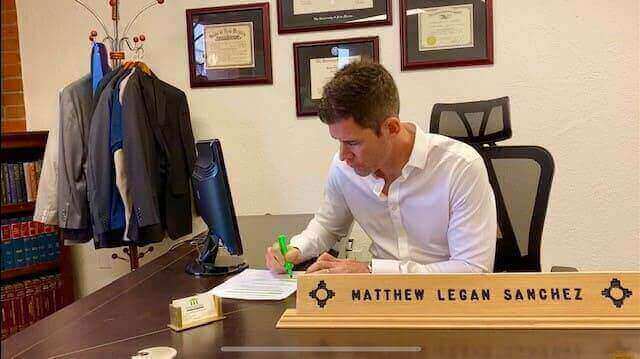
Divorce and separation often strike like an earthquake, splitting homes into two. Parents are often left feeling stressed, lost, and confused when divorce and separation occur. Educating yourself about the child custody process acts as a light to guide you through the dark and mysterious process.
Are you going through a divorce or separation in New Mexico that involves a child? Here is what you should know about child custody in New Mexico.
NOT ALL CHILD CUSTODY CASES NEED TO BE A FIGHT
Some parents believe that only New Mexico courts can determine custody after a divorce or separation. This belief is incorrect. Parents can always reach an agreement on custody and timesharing issues.
New Mexico courts prefer when parents can effectively co-parent and decide issues such as custody, timesharing, and child support outside of court. Custody agreements – AKA Parenting Plans — reached by parents can become valid and enforceable court orders without prolonged court involvement and litigation.
Can you and your ex come to an agreement about child custody issues? Great. If so, it will not be necessary to go before the court and present your case, allowing the judge to decide the issues. With that said, you should always speak with an experienced child custody lawyer before signing a custody agreement.
New Mexico courts generally only become involved with custody cases when parents are unable to agree on custody and timesharing. In these cases, New Mexico courts always determine custody issues based on a child’s best interests.
CHILD CUSTODY INOLVES BOTH LEGAL AND PHYSICAL ISSUES
There are two types of child custody issues: legal and physical. Legal issues involve legal rights and a parent’s ability to make decisions regarding issues that impact the child. Legal custody determines a parent’s rights and responsibilities to make decisions about a child’s education, religion, healthcare, schooling, and extra-curricular activities.
New Mexico law presumes that a child is best served when parents share joint legal custody. This presumption means that New Mexico courts will usually grant joint legal custody that enables both parents to make decisions on the child’s behalf.
Physical custody means the time that the child spends with each parent. When parents are unable to determine physical custody, the court will decide the appropriate timesharing schedule based on the child’s best interests.
ALL CHILD CUSTODY CASES ARE CREATED DIFFERENTLY
Each child custody case is completely different. Child custody decisions are made based on a case’s unique facts that ultimately determine the child’s best interests.
The facts and circumstances in your case will differ from another case. The following facts vary with each case:
- The child’s age;
- Each parent’s relationship with the child;
- Co-parenting and/or communication issues between the parents;
- CYFD involvement;
- Order of Protection/Restraining Order;
- Mental Health Issues;
- Substance Abuse Issues; and
- Any unique issue that impacts the child’s best interests.
Based on these factors, joint legal custody may be appropriate for one family. For another family, sole legal custody may be appropriate. The appropriateness of joint or sole legal custody depends on your unique family and facts.
Comparing your case to another case is like comparing an apple to an orange. Your friend’s child custody case is different than your child custody case. You should not judge your case based on the outcome of a friend or family member’s case.
Family and friends are an amazing resource of support. However, you should always speak with an experienced New Mexico child custody attorney about how NM law impacts your unique case.
ARRESTS CAN HURT YOUR CUSTODY CASE — WHAT YOU SHOULD KNOW ABOUT CHILD CUSTODY IN NEW MEXICO
A recent arrest can be used against you to potentially demonstrate parental unfitness. Prior arrests can haunt your custody case. Arrests for domestic violence, child abuse, or alcohol related arrests can significantly harm your custody case in New Mexico.
Prior or recent arrests are often used as the basis for an Order of Protection/Restraining Order. It is extremely important to avoid police involvement and arrests when divorce or separation is looming.
COMMUNICATE POSITIVELY WITH YOUR EX
Co-parenting and communication are big issues that impact custody and timesharing. When communication issues are present, the court may view you as the problem. The court viewing you as the unreasonable parent can destroy your case, reducing your overall time with the child. You should always try to communicate positively with the other parent. Let your ex be the unreasonable parent that is the source of the problem. Let your ex hurt their case through insulting and harassing communication.
Positive communication can reduce stress and prolonged litigation. Positive communication may also increase the likelihood of an out of court resolution. Whenever possible, communicate positively with your ex.
COMMON CHILD CUSTODY PHRASES IN NEW MEXICO
Lawyers have their own technical language that is called legalese. Here are some of the common phrases used during child custody cases in New Mexico. Understanding these phrases will help you to better understand the child custody process.
Best Interests of the Child: Your assigned judge will determine custody of the child based on the child’s needs and interests. Your child’s best interests are determined based on several factors including parental fitness, bonding with the child, status quo visitation, the child’s age, each parent’s mental health, substance abuse issues, and any concerns.
Legal Custody: Means a parent’s right to make decisions that impact the child’s growth and development. These decisions relate to religion, education, medical care, school, and extra-curricular.
Joint Legal Custody: Joint legal custody enables both parents to make decisions regarding a child.
Sole Legal Custody: One parent has physical and legal custody over the child. In some cases, one parent can have sole legal custody, yet the other parent still has court ordered communication or visitation with the child. The parent with sole legal custody can make all decisions that impact the child, unless limited by the court.
Physical Custody: The time that the child spends with each parent. This is also referred to as timesharing or visitation.
Joint Physical Custody: Means that the child spends time with both parents.
Primary Physical Custody: Means that one parent has the child a greater percentage of the time. Parents can have joint physical custody (i.e. share time of a child), with one parent having primary physical custody (i.e. the child is with one parent more than the other).
Supervised Visitation: New Mexico courts can grant supervised visitation in situations where one parent poses a danger to the child. Supervised visitation can take place with a neutral third party such as APN or Neutral Corner. Supervised visitation can also take place with a trusted family member, or court appointed supervisor.
Therapeutic Supervised Visitation: At times visitation must take place with a mental health professional supervising the visitation. This therapeutic process may take place with an agency such as Relationship Works.
Neutral Exchange Location: Cases with co-parenting issues, but no danger, often require the parents to exchange the child at a neutral location. This location may be a police station, Target, or other business’s parking lot. This exchange location may also be a facility such as APN or Neutral Corner that supervises the exchanges.
Our Family Wizard & Talking Parents: Co-parenting communication apps that enable the court to monitor communication between the parties. These co-parenting apps usually include a “tone monitor” that detects inappropriate communication. These apps can be ordered in child custody cases with communication issues.
Experienced Divorce and Child Custody Lawyer: Matthew Legan Sanchez. Give him a call at (505) SANCHEZ.
(505) SANCHEZ EXPLAINS WHAT YOU SHOULD KNOW ABOUT CHILD CUSTODY IN NEW MEXICO
Are you going through a divorce and searching for information on what you should know about child custody in New Mexico? Matthew Legan Sanchez has practiced family law in New Mexico for over a decade and has the trial experience needed to successfully handle your child custody case. Call (505) SANCHEZ For more information.

What You Should Know About Child Custody in New Mexico







